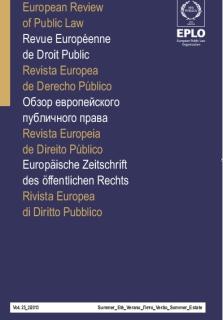
THE 'NEW SEPARATION OF POWERS',
CONSTITUTIONALISM,
AND THE REGULATION
OF PUBLIC-PRIVATE COOPERATION
DAVID FELDMAN
Rouse Ball Professor of English Law, Faculty of Law, University of Cambridge
This article considers the relationship between constitutionalism and the growth of arrangements whereby the private sector increasingly takes over or participates in important, social-welfare functions previously exercised by politically accountable institutions. It argues that this presents a significant challenge for constitutionalism by making markets more important than politics in establishing the type and quality of services which people receive. Accountability according to criteria such as value for money tends to limit democratic choice, replacing state coercion (imperium) with economic power (dominium). Controlling possible failures in the market has necessitated a new class of state institutions discharging regulatory functions and exercising imperium for those purposes. The article considers how, as a matter of constitutional principle, these institutions should relate to other arms of the state.
Cet article examine la relation entre le constitutionnalisme et l'augmentation des accords où le secteur privé prend le contrôle ou participe de plus en plus à des fonctions sociales importantes auparavant exercées par des institutions politiquement responsables. Il affirme que cela représente un défi significatif pour le constitutionnalisme en accordant plus d'importance aux marchés qu'à la politique dans l'établissement du type et de la qualité des services fournis aux gens. Une responsabilité répondant à des critères tels que le bon rapport qualité-prix tend à limiter le choix démocratique en remplaçant la coercition d'Etat (imperium) par le pouvoir économique (dominium). Le contrôle de défaillances possibles du marché a nécessité une classe nouvelle d'institutions publiques assumant des fonctions de régulation et exerçant l'imperium à cet effet. L'article examine comment, en tant que principe constitutionnel, ces institutions devraient être rattachées à d'autres branches de l'Etat.





















